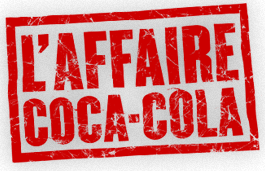Documental que reseña el pleito de un pequeño Sindicato Colombiano (Sinaltrainal) [[- «Campaign to Stop Killer Coke», Javier Correa y William Mendoza (Sinaltrainal) & Ray Rogers (Director, Campaign to Stop Killer Coke).]], [[- The SunTrust/Coca-Cola Six-Pack: Getting Away With Murder- Coke can’t hide its crimes in Colombia – A few of killer Coke’s casualties – Human Rights Scandal leaves ’Six Pack’ speechless – Coke Plus SunTrust: Formula for Terror .]], [[- «Stop Killer Coke«, Madeleine Baran, Dollars & Sense – Real World Economics, noviembre 2003 *CAMPAIGN TO STOP KILLER COKE: Coca Cola Board of Directors – Killer Coke’s Casualties – Two Faces of Coke: Coke can’t hide its crimes in Colombia / Human Rights scandal leaves ’six pack speechless – Coke’s other crimes and abuses.]] contra la gigante Coca Cola. Amparados por una ley usamericana que permite que extranjeros presenten casos en sus tribunales por violaciones de derechos humanos cometidos por sus empresas. Los trabajadores estan empecinados en que se haga justicia, la multinacional no quiere ceder, sin embargo se empieza a ver afectada por la campaña intensa llevada en su contra, una historia de un David y un Goliat con efectos sociales, politicos y publicitarios sin precedentes. ¡Una historia de solidaridad internacional! # FrançaisThe Coca-Cola Case – A documentary film about Coke and labour rights in the bottling plants [[The film

Columbia is the trade union murder capital of the world. Since 2002, more than 470 workers’ leaders have been brutally killed, usually by paramilitaries hired by private companies intent on crushing the unions. Among these unscrupulous corporate brands is the poster boy for American business: Coca-Cola.
Talk to Martin Gil: His brother Isidro was killed at point-blank range while working at the Coca-Cola bottling plant in Carepa, because he was part of a union bargaining unit. Like most violent crimes committed against Colombian union leaders, Gil’s murder went unpunished.
However, U.S. lawyers Daniel Kovalik and Terry Collingsworth, as well as activist Ray Rogers, stepped in and launched an ambitious crusade against the behemoth Coca-Cola. In an incredible three-year saga, filmmakers Germán Gutiérrez and Carmen Garcia follow these heroes in a legal game of cat and mouse. From Bogotá to New York, Guatemala to Atlanta, Washington to Canada, The Coca-Cola Case maintains the suspense of a hard-fought struggle.
The lawyers filed several cases at the U.S. federal court against Cola-Cola for murder, abduction and torture committed in Colombia and Guatemala. Thanks to activist Ray Rogers, they also attacked the brand image of the Atlanta-based giant, with the devastating campaign Stop Killer Coke!, causing dozens of U.S. colleges and universities to boycott the drink.
Still the company would not give up. After five years of haggling, will the lawyers get justice? In the end, they reach a settlement of sorts, but what will the victims choose -cash, or power and integrity?]]. You’ll never look at a can of Coke the same way after seeing this documentary film. Directors German Gutierrez [[- Germán Gutiérrez

After studying filmmaking, Germán Gutiérrez worked first as an assistant cameraman and later as a cameraman for “Radio-Canada”, the “National Film Board” and a variety of production companies. He soon moved on to directing, initially focusing on social and political issues.
This work took him to the four corners of the earth, often to conflict zones: Cambodia, Sarajevo, South Africa, Rwanda and El Salvador. Gutiérrez now has over twenty films to his credit, including La familia latina (1986) –Golden Sheaf Award, Yorkton Festival; Societies Under the Influence (1997), Martin’s Inferno (2002) and Who Shot My Brother? (2005) –Audience Choice Award at the Festival du nouveau cinéma). He has also collaborated on a number of television series, including Surviving the Wild (1999) and Technopolis (2001). His outstanding work on the series Insectia earned him numerous awards.]] and Carmen Garcia [[- Carmen Garcia

Carmen García made her start as a producer in 1984 at Ciné-Contact with L’enjeu des femmes, a documentary series directed by filmmakers from across the world, including Mira Nair. In 1988, she co-founded “Argus Films” with Germán Gutiérrez and produced Germán Gutiérrez’s Le système «D», Gilles Courtemanche’s L’Église du sida and Mary Ellen Davis’ La terre des autres.
She also collaborated with companies such as “Pixcom” and “Gala Films” and with the “National Film Board of Canada” as a producer, script writer and director. Since 2003, after a contract at “Telefilm Canada”, she has given a new direction to “Argus Films”. Recent titles include The Coca-Cola Case (2009); Sans banque et sans regret (2009); Nadia’s Journey (2007) –Prix caméra au poing, RIDM, Special Jury Prize, Figra; Who Shot My Brother? (2005) –Audience Choice Award, Festival du Nouveau Cinéma, nominated for a Jutra award, Best of Festival, Columbus.]] present a searing indictment of the Coca-Cola empire and its alleged kidnapping, torture and murder of union leaders trying to improve working conditions in Colombia, Guatemala and Turkey. The filmmakers follow labour rights lawyers Daniel Kovalik and Terry Collingsworth and an activist for the Stop Killer-Coke! Campaign, Ray Rogers, as they attempt to hold the giant U.S. multinational beverage company accountable in this legal and human rights battle. L’affaire Coca-Cola – Un film documentaire sur Coca-Cola et le droit des travailleurs dans les usines d’embouteillage.
Une fois que vous aurez vu ce documentaire, votre Coke n’aura plus jamais le même goût. Les réalisateurs German Gutierrez et Carmen Garcia dressent un réquisitoire accablant contre l’empire Coca-Cola, soupçonné d’être impliqué dans l’enlèvement, la torture et le meurtre de chefs syndicaux qui luttaient pour l’amélioration des conditions de travail en Colombie, au Guatemala et en Turquie. Les cinéastes s’attachent aux avocats en droit du travail Daniel Kovalik et Terry Collingsworth, ainsi qu’au militant Ray Rogers, directeur de la campagne Stop Killer-Coke!, alors qu’ils mettent tout en œuvre pour obliger le géant américain de l’industrie des boissons à répondre de ses actes dans cette bataille juridique pour les droits de la personne.
The filmmakers – InterviewsThe Coca-Cola Case: Responsibility: In this interview, filmmakers Carmen Garcia and German Gutierrez discuss the notion of responsibility as it pertains to The Coca-Cola Case.The Coca-Cola Case: Themes: In this interview, filmmakers Carmen Garcia and German Gutierrez discuss some of the themes explored in The Coca-Cola Case.The Coca-Cola Case: The approach: In this interview, filmmakers Carmen Garcia and German Gutierrez discuss the approach they took for their documentary The Coca-Cola Case.The Coca-Cola Case: Courage and social justice: In this interview, filmmakers Carmen Garcia and German Gutierrez discuss courage and social justice as it pertains to the making of The Coca-Cola Case.The Coca-Cola Case: The documentary, an alternative voice: In this interview, filmmakers Carmen Garcia and German Gutierrez discuss how The Coca-Cola Case the documentary serves as an alternative voice demanding workers’ rights.

(2 de agosto de 2010)






